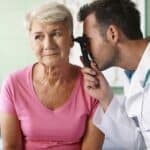About 15% of adults ages 18 and older have some form of trouble hearing, making it no surprise that hearing problems come in a wide variety of forms. Ear drum damage, however, can be very serious and is best treated by a professional ear nose and throat doctor. Here’s what all patients should know about the causes and treatments of ear drum damage.
Causes of Ear Drum Damage
Contrary to popular belief, ear drum damage doesn’t always occur as a result of a loud sound or blast. It can be caused by a middle ear infection, which involves an accumulation of fluid in the inner ear. It can also occur as a result of barotrauma — changes in barometric pressure that cause eardrum imbalances. This is often the case for patients who sustain damage while flying in an airplane, scuba diving, or taking a direct blow to the ear.
Ear drum damage can also occur when foreign objects are stuck in the ear canal. Severe head trauma has also been determined as a cause in rarer cases.
Ear Drum Damage Diagnosis and Treatment
In most cases, professional ear nose and throat doctors can determine whether or not you have ear drum damage simply by examining your ear with an otoscope (lighted instrument). In some special cases, your ear nose and throat doctor may order additional testing, which may include a tuning fork evaluation, lab testing, tympanometry (a device that measures the ear drum’s slight changes to pressure), and other audiology exams. Usually, a torn or ruptured ear drum will heal on its own without other treatment. That being said, if your ENT detects an infection, they may prescribe antibiotic ear drops. And in the most severe cases, an ENT specialist may apply an eardrum patch intended to stimulate growth. For chronic issues or when all other treatment options have been exhausted, your ENT may provide a tympanoplasty, a surgery that involves closing the hole in the ear with a graft of your own tissue. This is typically an outpatient procedure.
Ultimately, ear problems come in many different forms, and if you experience anything unusual or any level of hearing loss, it’s best to seek professional ENT treatment as soon as possible.



